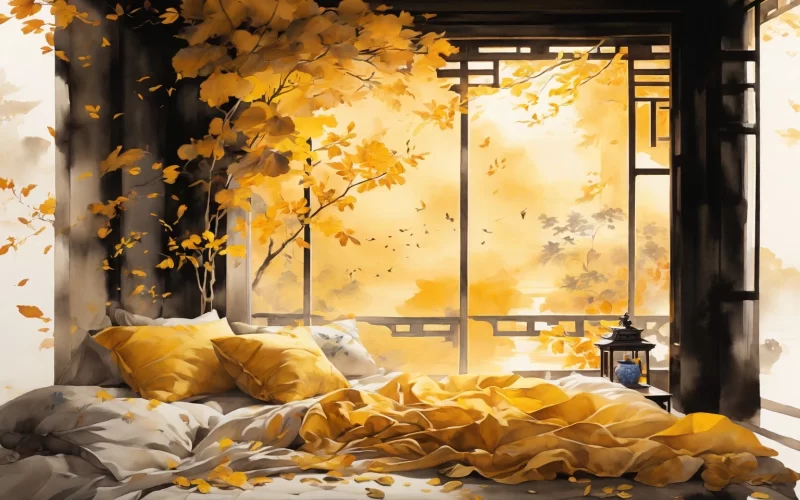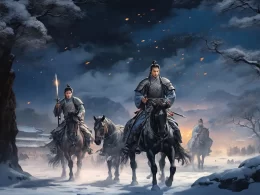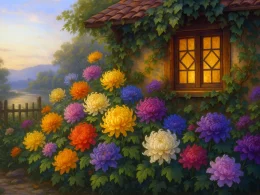When the fair one was here, flowers filled the hall;
Now she is gone, only the empty bed is left.
The broidered quilt is rolled up, I cannot sleep;
For three years, her fragrance still lingers.
The fragrance will not fade away;
But the fair one will not come back.
My longing falls like yellow leaves;
White dew dampens the green moss.
Original Poem
「长相思 · 其三」
李白
美人在时花满堂,美人去后花馀床。
床中绣被卷不寝,至今三载闻余香。
香亦竟不灭,人亦竟不来。
相思黄叶落,白露湿青苔。
Interpretation
This poem is one of Li Bai's three "Endless Yearning" compositions, written from the perspective of a lovesick man expressing endless longing after his beloved's departure. Through contrasting scenes of "when the beauty was here" and "after the beauty left," and using everyday images like "empty bed," "embroidered quilt," and "lingering fragrance," the poem progressively depicts inner loneliness and persistent yearning with poignant emotion.
First Couplet: "美人在时花满堂,美人去后馀空床。"
Měirén zài shí huā mǎn táng, měirén qù hòu yú kōng chuáng.
When she was here, flowers filled the hall; After she left, only an empty bed remained.
The opening contrasts past vibrancy with present desolation. "Flowers filled the hall" metaphorically conveys the joy and vitality she brought, while "empty bed" embodies physical absence and emotional void. The stark juxtaposition highlights the transformative power of her presence and absence.
Second Couplet: "床中绣被卷不寝,至今三载闻余香。"
Chuáng zhōng xiù bèi juǎn bù qǐn, zhìjīn sān zǎi wén yú xiāng.
The embroidered quilt stays rolled up, unslept in; Three years on, her fragrance seems to linger.
The untouched quilt symbolizes his refusal to move on, preserving the space as a shrine to memory. "Three years" emphasizes time's passage, while "lingering fragrance" blends memory with sensory illusion, showing how longing transcends reality through persistent attachment.
Third Couplet: "香亦竟不灭,人亦竟不来。"
Xiāng yì jìng bù miè, rén yì jìng bù lái.
The fragrance never fades, yet she never returns.
This couplet heightens emotional tension through parallel structure. The enduring fragrance represents hope and memory's persistence, while her perpetual absence underscores cruel reality. The repetition of "never" conveys resignation and despair, marking the poem's emotional climax.
Fourth Couplet: "相思黄叶落,白露湿青苔。"
Xiāngsī huángyè luò, báilù shī qīngtái.
Longing falls like yellow leaves; White dew dampens the moss.
The conclusion shifts to symbolic nature imagery. "Yellow leaves" suggest fading vitality and accumulated sorrow, while "dew on moss" paints a picture of neglect and isolation. These images externalize his desolate heart, leaving a lingering melancholy.
Holistic Appreciation
Structured around past-present contrast, the poem delves progressively deeper into emotion—from visual emptiness to tactile absence, then to olfactory memory, finally settling into hopeless acceptance. By anchoring abstract longing in concrete objects, it makes three years of yearning both palpable and profoundly moving. The cyclical structure—from vibrant memory to present desolation—mirrors the inescapable nature of true longing.
Artistic Merits
- Vivid Detail and Progressive Depth: Simple images like the empty bed and rolled quilt reveal profound emotional states with subtle intensity.
- Psychological Realism Through Blended Realities: The "lingering fragrance" merges memory with illusion, portraying how deep attachment distorts perception over time.
- Parallel Structure and Emotional Contrast: The balanced couplet "The fragrance never fades, yet she never returns" sharpens the clash between hope and despair.
- Symbolic Conclusion with Lingering Mood: Autumn imagery conveys inner desolation without explicit lament, allowing the scenery to embody unspoken sorrow.
Insights
The poem reveals a universal truth: we often anchor emotions to objects, and after loss, everyday items become vessels of memory and obsession. It shows how profound longing can defy time but also risk trapping one in the past. This reminds us to cherish present moments with loved ones while finding the courage to eventually move forward—allowing memory to enrich life without becoming its burden.
About the poet

Li Bai (李白), 701 - 762 A.D., whose ancestral home was in Gansu, was preceded by Li Guang, a general of the Han Dynasty. Tang poetry is one of the brightest constellations in the history of Chinese literature, and one of the brightest stars is Li Bai.












